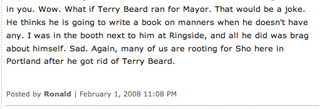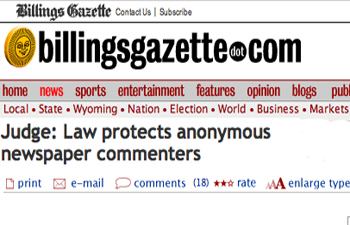Political campaigns often produce a blizzard of ancillary election-related litigation — for an example, just look to the 2000 presidential campaign. When the press reports anonymous accusations during an election campaign, sometimes that litigation involves lawsuits by candidates or public officials seeking to learn the identity of those anonymous sources. In many states, newspapers and other media can protect such sources under media shield laws.
Media shield law cases often fit a typical pattern, with a reporter refusing to reveal an anonymous source who provided allegedly defamatory information. But two recent local election campaigns in Montana and Oregon have yielded rulings protecting a different sort of anonymous source — members of the public posting comments directly to a newspaper’s website.
The fallout from a hotly contested race in Montana produced such a ruling under the Montana Media Confidentiality Act and an election controversy in Oregon similarly resulted in a ruling protecting the authors of anonymous blog comments on an Oregon newspaper website under the Oregon Media Shield Law.
Shield Laws
In general, shield laws protect media outlets from legal efforts aimed at exposing reporters’ anonymous sources. “In general” is the key phrase here, because individual state shield laws vary greatly in their provisions, including whether they apply only to “newspapers,” or whether they apply to other forms of media. Some cover efforts to unmask sources in civil suits only, while others extend protection to criminal cases as well. Many states have no shield law as such, but in their absence courts have sometimes relied upon state constitutional law or other general principles to craft protections for media sources. The interpretations of these laws vary as widely as the language of their individual provisions.
Notably, there is no federal shield law, although there have been recent efforts to enact one.
Doty v. Molnar
But on to Montana. Russ Doty, who lost a 2004 race for a seat on the Montana Public Service Commission to rival Brad Molnar, claimed that Molnar had made false accusations against him concerning his qualifications to run for office. Doty failed to convince state officials to charge Molnar with violating the state’s political civil libel statute (a statute worth a blog post all on its own). The Montana Supreme Court upheld that decision, and Doty subsequently decided to file a civil defamation suit against Molnar.
At some point in the course of the defamation litigation, Doty came to focus on negative statements made about him in comments to posts on the website of the Billings Gazette. As related in a story in the Gazette, Doty served a subpoena on the newspaper seeking the IP and email addresses of the authors of the anonymous comments. Doty alleged that Molnar was in fact one of the anonymous posters, although Molnar denied this in a deposition. Doty contended that he had a “right to test whether or not Molnar is telling the truth when he says in his deposition that he is not either of these people.”
The Billings Gazette argued that the authors of the anonymous comments are protected under Montana’s Media Confidentiality Act. This Act is quite broad, and provides that “no…newspaper, magazine, press association, news agency, news service, radio station, television station, or community antenna television service or any person connected with or employed by any of these for the purpose of gathering, writing, editing, or disseminating news…may be required to disclose any information obtained or prepared or the source of that information in any legal proceeding if the information was gathered, received, or processed in the course of his employment or its business….”
On September 3, the trial court quashed Doty’s subpoena. According to the Gazette’s account of the ruling (there is no written opinion), Judge G. Todd Baugh focused on the language of the Media Confidentiality Act that protects “any information obtained or prepared” by any of the enumerated news outlets. He concluded that the information Doty sought — the e-mail and IP address information — fell clearly within this language. He also took a swipe at the merits of Doty’s claim, suggesting that anonymous comments may not have sufficient credibility to legally support a claim for defamation.
Beard v. Doe
In the Oregon case, a defamation complaint was filed, not by a candidate, but by a local businessman, Terry Beard, who was mentioned in an anonymous comment made on the Portland Mercury website to a blog post regarding a municipal election campaign. (Both the post and the comment by “Ronald” are still on the website.) Beard claimed that the comment was defamatory, and he sought to obtain the e-mail and IP address of the anonymous commenter. The Portland Mercury and another newspaper objected to Beard’s request.

On September 30, Judge James E. Redman of the Clackamas County Circuit Court ruled that the identity of the anonymous commenter was protected under the Oregon Media Shield Law, which protects “the source of any published or unpublished information obtained by the person in the course of gathering, receiving, or processing information for any medium of communication to the public.” The court concluded that the quoted language protects “not only news, but also ‘data’ and what is commonly understood as information,” i.e., the email address and the IP address of the commenter.
The court emphasized that the comment was written in response to a blog post concerning the election, noting that the newspaper “invited readers to comment on the blog post,” and suggested that if the comment had been “totally unrelated to the blog post,” then it might have been argued that the newspaper did not receive it in the course of newsgathering activity. But the court concluded that in any event, the shield law is “broadly written and…intended to protect a broad range of media activity, not simply news gathering.”
Applicability Elsewhere?
Are these rulings transferable to other states? Given the great variety in the language and interpretation of state shield laws, neither ruling is likely to have direct applicability unless another state has an identical or very similar shield law. But sometimes courts in other states will look to the spirit of a ruling rather than its legal detail, so it is possible that both rulings could influence other courts in interpreting their own shield laws.
Are authors of anonymous comments on newspaper sites out of luck if the state shield law does not extend to them? Not necessarily. Shield laws are not the only game in town in terms of protecting anonymous speakers. Because these courts found that the anonymous posters were protected by their respective state shield laws, neither court found it necessary to address the broader First Amendment issues implicated in cases involving anonymous speech in general, and political speech in particular. In McEntyre v. Ohio Elections Commission, 514 U.S. 334 (1995), the U.S. Supreme Court gave strong support to a First Amendment right to remain anonymous, particularly in the context of political speech.
And more recently, courts have relied on First Amendment grounds to block some efforts to identify anonymous online bloggers. In cases involving alleged defamation, some courts have held that plaintiffs must first establish the viability of their defamation claims before obtaining the identity of an anonymous alleged “defamer.” So even if a particular state’s shield law does not expressly cover anonymous comments to a newspaper Web site, in some cases the First Amendment may still come to the rescue.
Jeffrey D. Neuburger is a partner in the New York office of Proskauer Rose LLP, and co-chair of the Technology, Media and Communications Practice Group. His practice focuses on technology and media-related business transactions and counseling of clients in the utilization of new media. He is an adjunct professor at Fordham University School of Law teaching E-Commerce Law and the co-author of two books, “Doing Business on the Internet” and “Emerging Technologies and the Law.” He also co-writes the New Media & Technology Law Blog.


Yes, i accept with the topic which has given above that “Judges Rule Anonymous Commenters Protected By State Shield Laws”. Judge will have the power to rule anonymous commenters.
=============================
Franklin
oregon drug rehab
Does anyone know the case number for Beard v. Doe? I would like to cite it, but I can’t find the case number anywhere.
The case is Doe v. TS et.al.
Clackamas County Circuit Court
Case no. CV 08030693